Influential SC Megachurch & ARC Founder Linked to Silencing NDAs
The Spiritual Abuse Institute (SAI) is committed to increasing transparency around the use of non-disclosure agreements (NDAs) in religious settings. As part of our ongoing efforts to promote healthy, accountable, and transparent church environments, we maintain a public, factual database of churches and ministries reported to have used NDAs that could limit transparency and open communication.
Today, we are adding Seacoast Church a multisite church based in Mount Pleasant, SC to the Church NDA Disclosure Database.
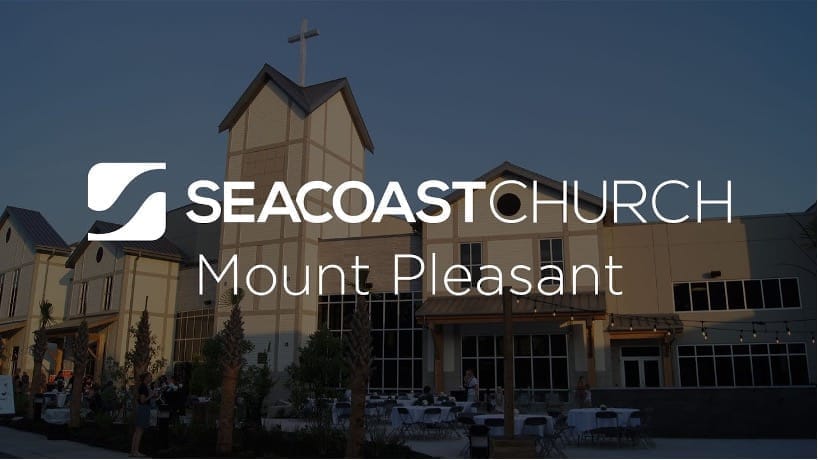
Seacoast Mount Pleasant Campus
Who is Seacoast Church?
Seacoast Church was founded in 1988 with 65 people in an apartment clubhouse. Far from those humble beginnings, the church has grown into a massive multisite church spanning 15 physical locations across the Carolinas. Today, outreach.com lists Seacoast as the 47th largest church in the United States, averaging just under 13,000 in weekly attendance in 2025.
According to Seacoast founder Greg Surratt, the church was one of the pioneers of the multisite movement. ““We were one of the first churches to make multi-site a core part of our strategy” said Surratt.[1] This paints Seacoast as a major trendsetter in the modern landscape of the American Church.
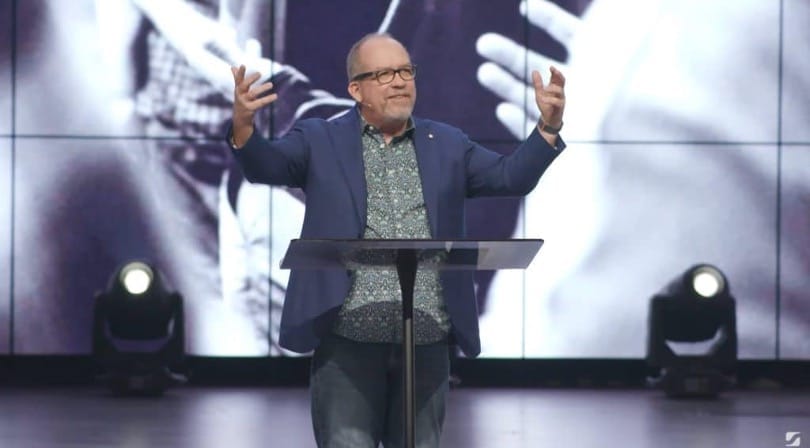
Founding pastor, Greg Surratt, preaching at Seacoast Church.
Seacoast also helped to found the Association of Related Churches (ARC) in the year 2,000. ARC has grown into a global church planting organization and one of the most influential church planting organizations in North America since by establishing over 1,000 local churches. The organization also provides a variety of resources, trainings, and events for church leaders across the globe. However, ARC has not been without controversy and many ARC pastors have been connected to moral failures, scandals, and lawsuits over the years. Greg Surratt is also no stranger to controversy.
Beyond church planting through ARC, Seacoast also houses the Pastor’s Collective, a non-profit founded in 2021 dedicated to addressing “the real and difficult work of planting, pastoring, and leading churches by fostering soul care, curating community, developing resources, and continuing a national dialogue on mental health in ministry.” Citing alarming statistics like pastoral burnout (42%) and loneliness (78% of pastors say they have no close friends,) the church paints a compelling picture for the need of this work.
With a goal to reach over 10,000 pastors by 2027 through the Pastor’s Collective, Seacoast’s influence on church leaders is likely growing by the day.
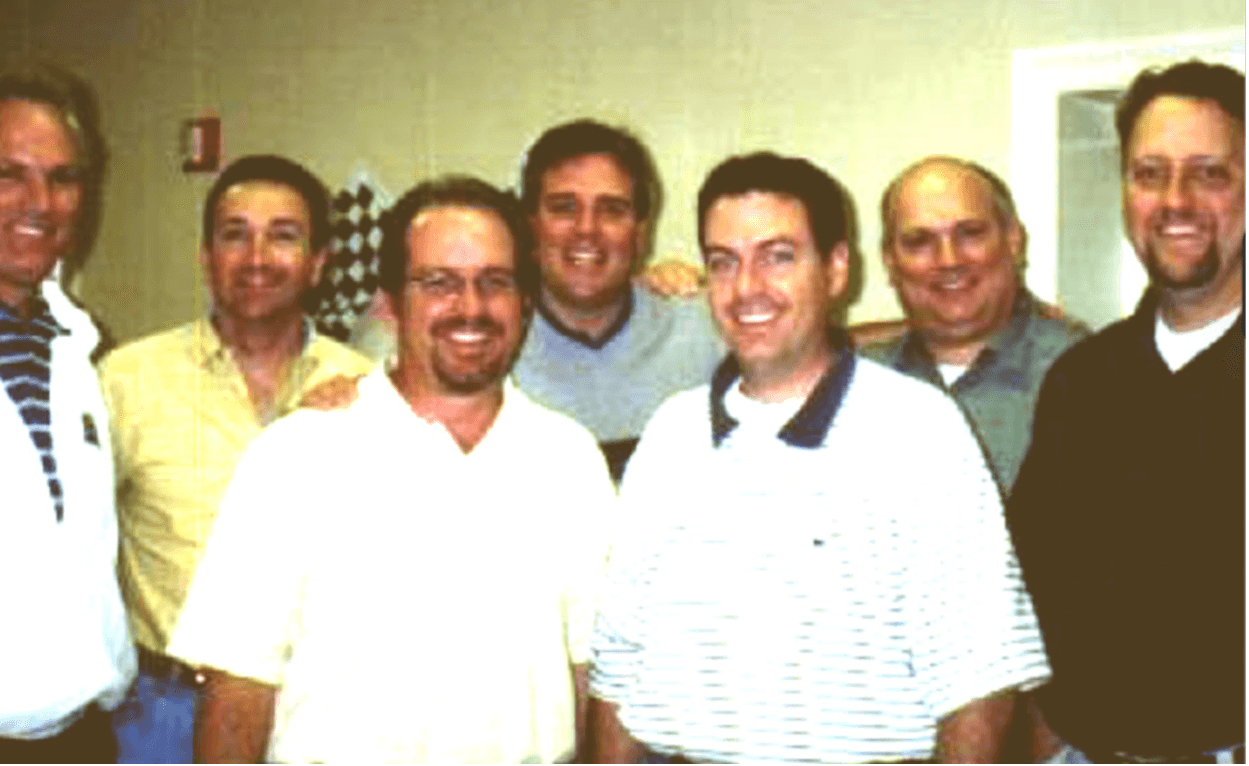
Greg Surratt (bottom left) and Chris Hodges (bottom right) at ARC’s Founding.
Seacoast also boasts multiple community initiatives like their North Charleston Dream Center which offers services like food assistance, high school mentoring, and a free clinic. The church also has a counseling center that sees thousands each year providing mental health care from licensed practical counselors at a rate of $125 an hour and with some financial scholarships and assistance provided.
When discussing Seacoast’s community involvement and ministry initiatives, Josh Surratt (senior pastor and son of founding pastor Greg Surratt) said: “We could sit here and share numbers of how many people have been through our clinic or how much food we give away on Thanksgiving, but what matter is that behind every number, there is a person.” [2]
Seacoast’s community engagement and the focus on the people behind the numbers is admirable. By the same token, their reported use of silencing NDAs raises questions given the potential negative impacts on those who sign them, who are also real people with real stories and real value within the Church at large.
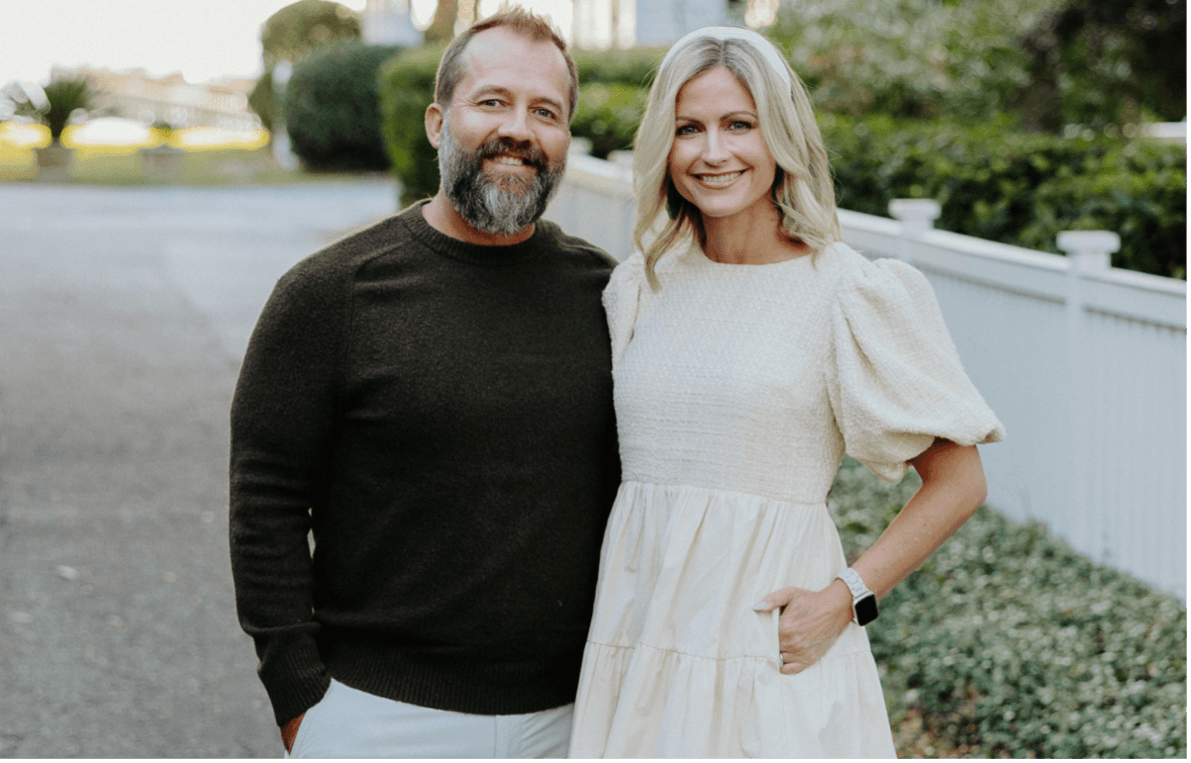
Seacoast co-pastors Josh and Lisa Surratt
Why Is This Church Being Added?
SAI received an anonymous submission of a document reported to be an NDA used by Seacoast Church. After careful review, including assessment against our published definition of a “silencing NDA,” we determined that the document meets our criteria for inclusion.
Being listed in this database does NOT mean Seacoast Church is abusive, unhealthy, or currently using an NDA — only that a document fitting our criteria was reported and reviewed in accordance with our process.
What Is a “Silencing NDA”?
A silencing NDA is any agreement that could restrict a person’s ability to speak freely about their experiences at a church or ministry, beyond what is necessary to protect sensitive personal or member information.
Churches choose to use documents that fit this description for various reasons. Many of which are not malicious, such as obtaining documents recommended by an HR or law firm.
Regardless of a church’s intent or their understanding of these documents, however, the reality is that they carry the potential to be used to silence people about concerns like sin, spiritual abuse, and other questionable practices. And these documents can often strike fear into the hearts of staff and parishioners who sign them, often under a feeling of duress.
The inclusion of churches on this database is about public transparency, education, and preventing those potential negative and harmful impacts. However, we make no assertions, assumptions, or judgments regarding a church’s leadership, theology, or community health based on their inclusion on this list.
Mental Health Questions
From the Pastor’s Collective to the counseling center, Seacoast is a church that seems to care greatly about people and their mental health. Current Seacoast lead pastor Josh Surratt framed it this way. “We want Seacoast to be a place that ministers to people in pain. The mental health crisis in our nation is just staggering.” He continued, “We realized that the mental health and addiction is almost at a pandemic level.”[3]
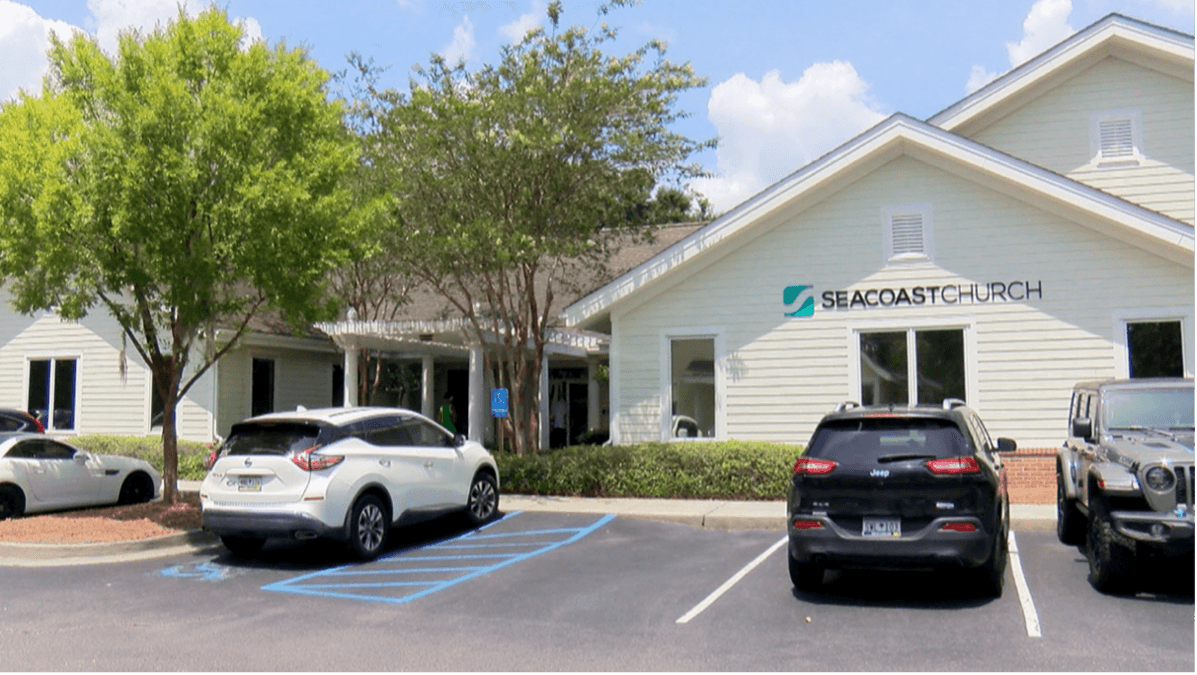
Seacoast Counseling Center
But are the pastors and elders of Seacoast church aware of the potential trauma and mental health impacts that silencing NDAs can have on a recipient, especially when entangled with their faith and given from a church they belong to? Do the counselors on staff know about the use of NDAs, and have they been given the opportunity to speak to the mental harm an NDA can cause?
Some of the mental health impacts on signers of NDAs and similar agreements in churches include: social isolation and the loss of support, feelings of powerlessness and helplessness, loss of personal agency, anxiety and hypervigilance, amplification of trauma, and re-traumatization. In extreme cases, the intense pressure of being silenced, isolated, and betrayed by a core community can lead to severe depression and suicidal ideation. These are massive potential impacts that should be hard for the Church globally to ignore!
One NDA signer from a different church described their feelings like this:
“I was naïve enough to think the NDA might even help me move on, that it would prevent me from dwelling on it with my new employer or friends. In reality, it has just created distance and isolation, and has prolonged the trauma of that experience.”
Another unrelated NDA signer said “It kind of closes down lots of avenues of support, while you’re going through the most hideous thing you’ve ever been through.” Beyond the social and mental health impacts though, signing an NDA in a church can also come with long term employment impacts and significant spiritual impacts.
A Trauma that Follows You
If a church staffer cannot explain their change in employment or the employment gap it created due to the NDA provisions, then they could lose job opportunities in the future.
Many church NDAs we have reviewed at SAI include both broad non-disparagement provisions and provisions banning the disclosure of even the existence of the agreement itself. These broad non-disparagement clauses often mean a signer cannot say anything that might harm the reputation of their former employer. So even saying “I cannot answer that question because I signed an NDA” could embarrass the issuer of the NDA, and is therefore off limits. The ban on discussing the document applies the same effect.
And as an NDA signer tries to answer well and honestly while also honoring their NDA in real time, their answer will often come across terse, as if it is withholding information and potentially being dishonest. The exact kind of answer you don’t want to give in a job interview.
Spiritual Damage from a Legal Document?
The spiritual harm, however, can be a unique and incredibly damaging form of distress for the signer of a church NDA. In a faith-based context, a person’s ability to "speak the truth" is often seen as a moral and spiritual imperative from a biblical standpoint.
Being forced by their church to sign a document that suppresses truth can create a severe spiritual crisis, leading to feelings of betrayal by God, the church, and their own faith. This can even lead to a person experiencing betrayal trauma psychologically.
Beyond the personal effects on a signee’s mental health, the use of NDAs in churches could allow potential systemic issues to persist. The signee carries the immense burden of knowing that their silence may enable harm (real or perceived) to continue for others, adding to their moral and psychological distress.
Is NDA Use on Mission or on Brand for Seacoast?
In addition to the mental health, spiritual, and even theological questions surrounding NDA us in churches (evangelical Christians are split on the issue, with only 21% saying yes to NDAs,) more questions arise from a missional perspective when researching Seacoast and their mission. Are documents like this helping them accomplish what they feel called to do and be as a church?
When discussing Seacoast’s history on the church’s website, founder Greg Surratt weighed in.[4]
“I knew I wanted Seacoast to be a church anybody could call home. I especially wanted it to be a place where non-believers were encouraged to check Christianity out at their own pace. I‘ve always been the kind of guys that asks a lot of questions, and being able to do that without feeling shut down or shut out is important to me.”
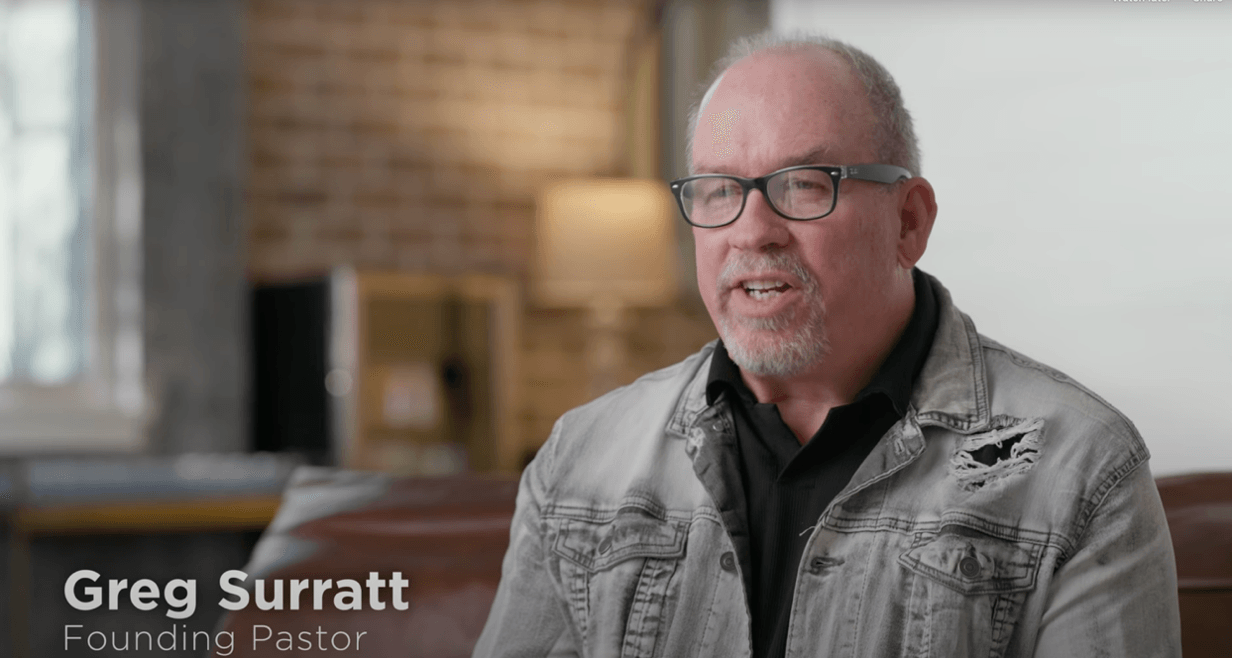
Greg Surratt describing the vision behind Seacoast’s founding.
Let’s take a deeper look together at what he said and the questions his words raise. The first part of the quote is about reaching unbelievers, and Seacoast being a place they can feel safe while checking out Christianity. And that’s an admirable and biblical goal!
At the same time, how would it impact those same curious non-believers if they found out Seacoast uses silencing NDAs? Would this accomplish 1 Peter 2:12? Would it meet the standard of being above reproach that the bible outlines for the Church and its leaders, or would it be cause for concern, questions, and reproach from the unbelievers the church is aiming to reach?
Would they see Seacoast as a life-giving church that is above reproach and different from the world, or would they see a church using the same worn practices as big business that they have tasted in the corporate world?
What if some of these unbelievers have had to sign NDA themselves in the past? What if they carry some of the trauma and scars from it that were detailed earlier in this article? How would that impact the way they see Seacoast, Jesus, and the Christian faith?
Heavy Questions and the Golden Rule
Greg also shared this personal tidbit. “I ‘ve always been the kind of guy that asks a lot of questions, and being able to do that without feeling shut down or shut out is important to me.”
That gives me pause. If Greg himself has always been a person who asks questions and doesn’t want to be shut down, then why would he use NDAs that could reasonably make the people of his church feel shut down, silenced, and isolated? Couldn’t such agreements cause church members to feel shut out from the community after signing?
Perhaps most importantly, how does he square this practice theologically in light of his own words. In Matthew 7:12, Jesus instructs his followers to abide by the golden rule. “Do to others whatever you would like them to do to you. This is the essence of all that is taught in the law and the prophets.”
Jesus doesn’t just command Christians to follow the golden rule, the equates it as the essence of all the rest of the scripture combined. He frames it as a practical way of living out the great commandment to love God. It’s an unmistakably big deal for Christians theologically!
Yet, here is Greg Surratt. A man who has always asked questions. A man who hates feeling shut down or shut out for seeking truth. A man who founded and pastors a church that allegedly uses silencing NDAs that deny church members the same space to ask questions and seek the truth.
Perhaps he doesn’t realize how this practice could cause harm. However, I would encourage Greg that it can. As someone who has been presented with a church NDA and someone who has spoken to hundreds if not thousands of NDA signers in the church, I can assure you these are common feelings that signers have. And they tend to linger long after the ink has dried.
Kind of a Big Deal
After hearing from Seacoast’s founders and current leadership via the website, it seems that they see what God is doing at Seacoast as much bigger than simply their church or the communities it serves. According to Lisa Surratt, co-lead pastor of Seacoast, “What Seacoast is, it’s bigger than us and the team. It really is about what God wants to do here and in every community where Seacoast calls home.”[5]
I agree with and applaud that statement. And I think it applies to NDA use as well.
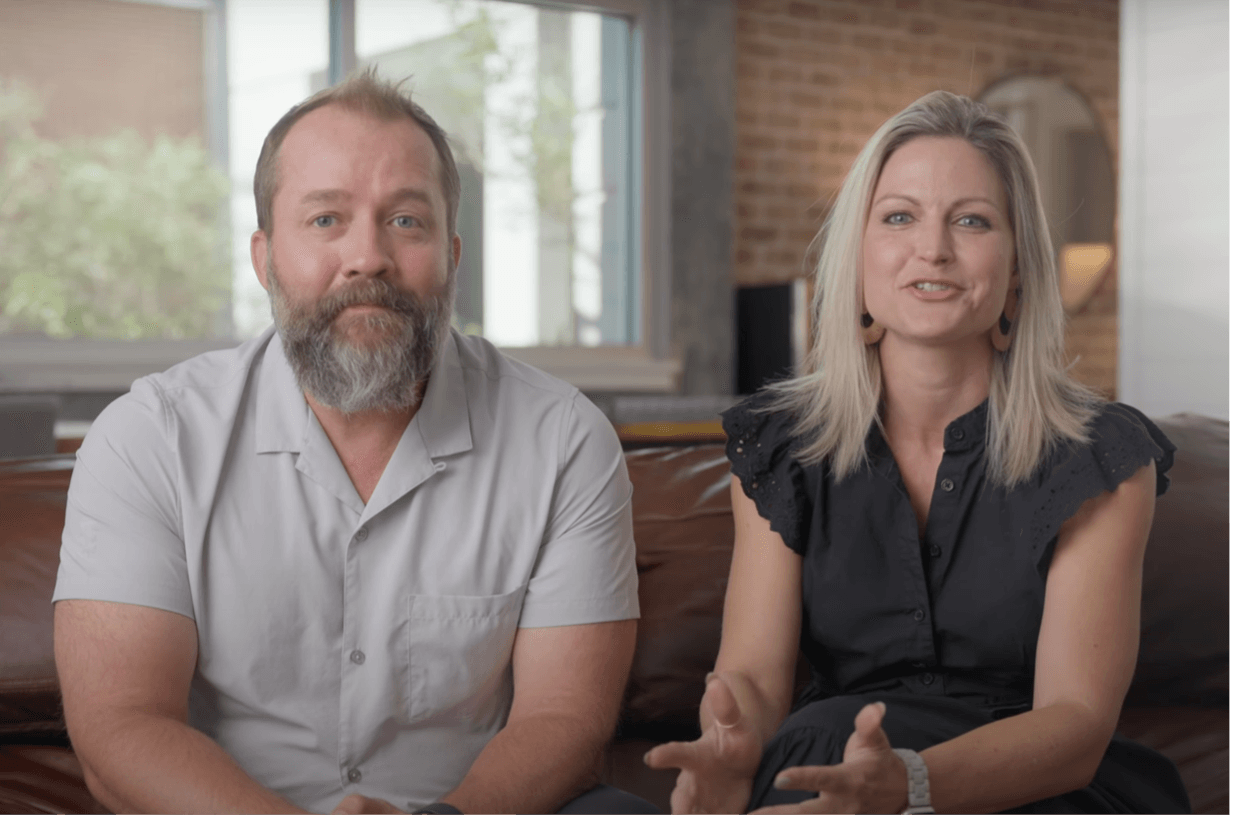
Josh and Lisa Surratt discussing Seacoast’s mission.
Many churches tell us at SAI that they use NDAs to protect against defamation and reputational harm to the body of Christ. And while protecting the reputation of the Church is an admirable endeavor, the way we are commanded to do so in the bible is through being above reproach. That no matter what accusations come our way, we can withstand that reproach, and that it would fall flat in the face of the bright light of the truth.
To instead protect the reputation of the church by using legal agreements and the threats of litigation that come with them (something we are biblically warned against,) seems to be counter biblical at best from this theologian’s point of view, and potentially harmful and dangerous to people at worst.
No church or person wants bad things spread about them. So, the best way to avoid that seems to be living above reproach and repenting quickly when we make mistakes. But even if mean things are falsely said about your church, why not rather be wronged as scripture encourages us (1 Corinthians 6:7?)
The potential harm done to signers of NDAs in the church would seem to me to be the more pressing concern. And as pastor Lisa said, it’s about more than the Surrat family or Seacoast church. It’s about every single soul the Lord allows them to impact.
With Great Influence, Comes Great Responsibility
As that great, unintentional theologian Uncle Ben said, “With great power, comes great responsibility.” And what was true for Spider Man should also be true for the Church. The more influence and resources a church has, the more responsible and careful it will need to be to steward it. Because without stewarding massive influence and resources well, a church can harm the people it serves, either un-intentionally or intentionally.
Seacoast Church is a church with great influence and resources. Church leaders around the United States and the world watch closely at what they do, and they treat Seacoast like an example to learn from. So, what Seacoast does matters far beyond its own walls. And that includes the reported use of silencing NDAs.
By Greg Surrat’s own admission, Seacoast helped pioneer the multi-site movement. That means church leaders are watching.
Greg Surratt and Seacoast founded ARC, perhaps the most influential church planting organization in North America right now. Greg regularly speaks for ARC events, and Seacoast will be hosting the ARC Conference in 2026 to celebrate the organization’s 25th anniversary.

ARC Conference 2026 at Seacoast Church.
According to ARC’s recent press release, this event will celebrate “a movement that has launched more than 1,160 life-giving churches around the world.” And this is just a milestone along the way to their stated goal of launching 2,000 churches. The same press release also boasts that the event drew “over 3,000 pastors and leaders from across the globe” this year.
ARC’s influence goes well beyond church leadership and events however, as they claim “more than 15,000” new believers from launch days alone of new churches. Between Seacoast’s average attendance of 12,957 and their extended global influence through ARC, the 47th largest church in the United States has significant influence on Christianity and the Church in our nation.
In addition to ARC, Seacoast’s Pastors’ Collective extends its influence even further. The reality is that Seacoast is not simply a church reaching its own community. It is also an organization training, impacting, and influencing church leaders across the country.
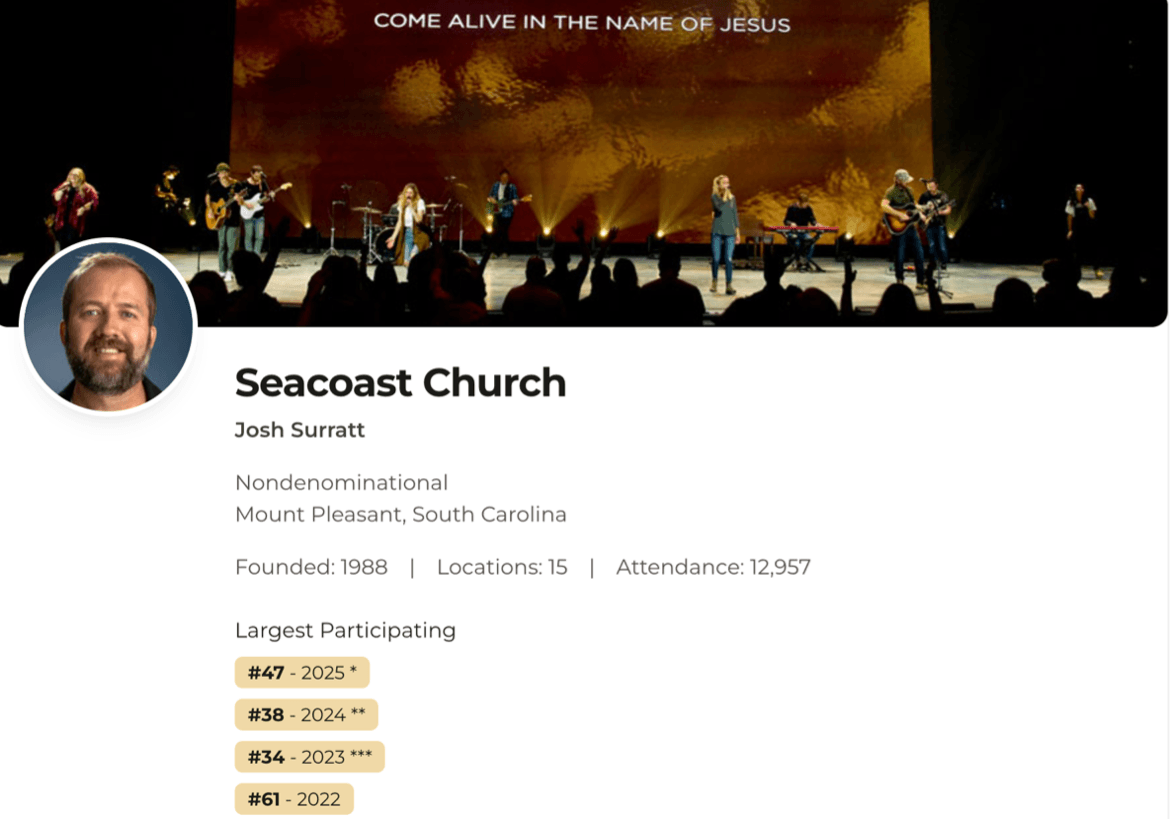
Seacoast Church Outreach 100 profile and attendance numbers.
Seacoast’s influence on other pastors and churches extends even further through the pastor’s collective, it begs the question: How has this impacted other churches and both their views on and potential use of silencing non-disclosure agreements.
So What Did Seacoast Say?
All NDA submissions are reviewed for consistency and the redaction of personal information, unless the article is based on another publicly available report. The church is then notified and given an opportunity to respond or provide clarification before publication.
Seacoast Church was contacted on September 17, 2025, and we followed up on September 30th. Here are the specific questions we asked; we also invited them to share any comments or clarifications they wanted SAI or the public to know.
1. Does your church use silencing NDAs currently?
2. Has the church used these documents in the past? If so, and you have ceased this practice, when did you stop and why?
3. What is the purpose of using these documents in your church setting?
4. Is the church’s staff aware of the use of these documents prior to signing them and of their potential legal implications?
5. Is the church congregation aware of the use of these documents and the potential legal implications for those who sign them?
At the time of publishing, we have not received a response from Seacoast Church. If we receive a comment from them in the future, we will update this article to include it.
Why Transparency?
Our goal is not to accuse, shame, or blacklist any church, but to empower individuals and organizations to make informed decisions about their faith communities. By documenting the reported use of silencing NDAs, we aim to foster open dialogue and greater accountability throughout all spiritual spaces.
Correction or Removal
If you represent Seacoast Church and wish to provide additional context, request a correction, or pursue removal from the database, please see our Removal and Correction Policy or contact us here.
Learn more about the NDA Disclosure Database here:
- NDA Disclosure & Publishing Process
Last updated: 10/22/25
[1] All quotes from the Surratt’s in this article come from their video about the history of Seacoast that can be found at https://www.seacoast.org/about or at on Seacoast’s Youtube Channel.
[2] YouTube, Seacoast Church, 25 Apr. 2025, youtu.be/B9rjlUc7Txc?si=gRM1DjbMypX7LoC6.
3] YouTube, Seacoast Church, 25 Apr. 2025, youtu.be/B9rjlUc7Txc?si=gRM1DjbMypX7LoC6.
[4] YouTube, Seacoast Church, 25 Apr. 2025, youtu.be/B9rjlUc7Txc?si=gRM1DjbMypX7LoC6.
[5] YouTube, Seacoast Church, 25 Apr. 2025, youtu.be/B9rjlUc7Txc?si=gRM1DjbMypX7LoC6.
Subscribe
Get more content like this and updates from SAI by subscribing below.
Your email address is safe with us .We never share your information with anyone
Accountability
2024 © SPIRITUAL ABUSE INSTITUTE

